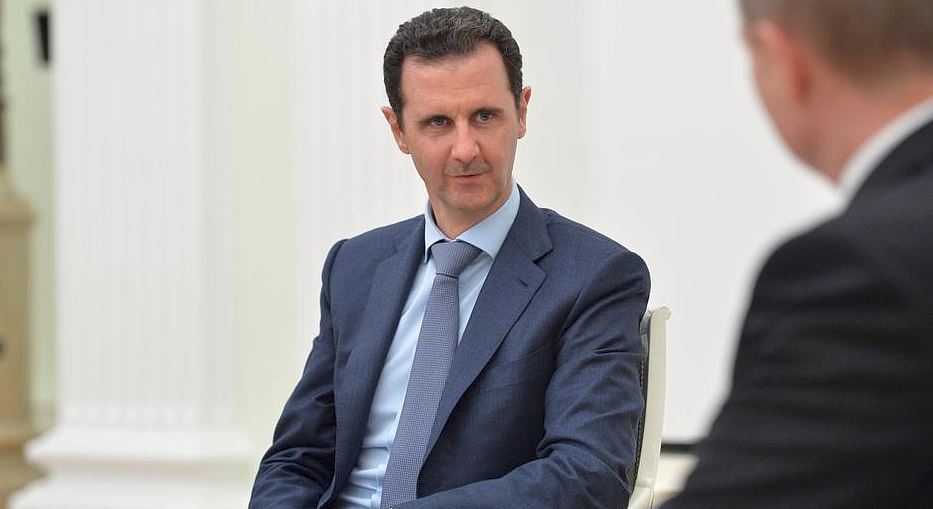Trump’s Syria Conundrum
Reports and videos currently streaming from Syria reveal a new large-scale, regime-led attack by chemical weapons against the civilian population of the city of Idlib. Close to a hundred people have been reported killed, including many children, while hundreds were said to have been receiving critical treatment when Assad regime warplanes targeted their hospital.

Published by The Lawfare Institute
in Cooperation With

Reports and videos currently streaming from Syria reveal a new large-scale, regime-led attack by chemical weapons against the civilian population of the city of Idlib. Close to a hundred people have been reported killed, including many children, while hundreds were said to have been receiving critical treatment when Assad regime warplanes targeted their hospital. The final death toll will not be known for days.
This is the political reality that comes from accepting the political reality of the Bashar Assad regime's survival in Syria: killing will now happen on an even larger-scale and with a greater sense of impunity. That sense of impunity flows from the reality of impunity.
For years, Syria’s pro-democracy and human rights activists warned the Obama administration about the impact of its repeated statements that it would not intervene in the Syrian conflict come hell or high water. Our warnings were ignored. When the administration finally drew its red line, it tied it exclusively to the use of chemical weapons by the regime at a time when the latter was using everything else in its arsenal to terrorize the civilian population, including its Scud missiles. And when the regime finally breached that red line in August 2013, killing more than 1,000 civilians in the East Ghouta region near the capital of Damascus, President Obama unceremoniously backed down. He would later pride himself on that retreat even as many in his own party sought to hide their faces in shame.
Now it’s the Trump administration’s turn.
Perhaps as a result of loosened targeting rules or perhaps not, more civilian targets have accidently been hit by U.S. warplanes, including a mosque and a school, killing dozens and making America directly a culprit in the wanton bloodletting in Syria.
Yet, it’s the recent statements by Secretary Rex Tillerson, UN Ambassador Nikki Haley and White House Spokesman Sean Spicer that take the cake.
During his recent visit to Turkey and following meetings with Turkish officials, Secretary Tillerson said that the "longer-term status of President Assad will be decided by the Syrian people."
Back in New York, Ambassador Haley told wire reporters that "Our priority is no longer to sit and focus on getting Assad out.” (We should pause here to note that getting Assad out was never really a priority for the Obama administration; words are not enough to get a killer out of a country.) The ambassador went on to wonder "Do we think he's a hindrance? . . . Yes,” she said answering her own question. But "Are we going to sit there and focus on getting him out? . . . No,” she assured. The ambassador would later walk back her comments, telling all that Assad is a “war criminal.” But she had already made the main point: war criminal or hindrance, he was not to be harassed.
Hours later came Mr. Spicer, who reiterated the comments made by Tillerson and Haley, and then spoke of a new “political reality that we have to accept in terms of where we are right now.” The opportunity to do something “with respect to Assad” was lost under the previous administration, he noted.
Spicer actually does have a legitimate point here; the Obama Administration’s Syria policy does complicate and limit the options available to the Trump administration now. But to blame the Obama administration, as Mr. Spicer did when he described the attack as “consequence of the past administration's weakness and irresolution," for this latest horrendous attack—an attack that happened on Mr. Trump’s watch and followed the reassuring messages that his administration has been sending to Mr. Assad for weeks now—is both appalling and repugnant, especially when we consider that Mr. Trump himself opposed enforcing the red line back in 2013:
AGAIN, TO OUR VERY FOOLISH LEADER, DO NOT ATTACK SYRIA - IF YOU DO MANY VERY BAD THINGS WILL HAPPEN & FROM THAT FIGHT THE U.S. GETS NOTHING!
— Donald J. Trump (@realDonaldTrump) September 5, 2013
Those of us who have been following the situation in Syria since the onset of its revolution in early 2011 cannot forget or ignore the miscalculations of the Obama administration in this regard, or their tragic consequences, and we may not be able to forgive, soon or ever, Obama’s pride in abandoning the Syrian people. But that does not mean that we can afford to engage in a new round of Shirk ‘n’ Shift: shirking responsibility for the current situation and shifting the blame to other parties. This is a recipe for more killing and more suffering.
It’s Mr. Trump who now occupies the White House, and it’s his responsibility to work with his cabinet members to formulate a more robust policy that can help end the suffering of the Syrian people. Blaming the Obama administration shows a lack of resolve or worse, a willingness to normalize a situation in which children get gassed in their sleep, hospitals are regularly targeted as part of a campaign to intimidate the civilian population, hundreds of thousands are forced to live under siege and in famine conditions for refusing to submit, millions are driven from their homes as part of a major ethnic cleansing campaign, and tens of thousands of dissidents are systematically liquidated in state prisons and hospitals.
Could anyone really believe that such a policy will make anyone safe, let alone make America great?
When the United States government reassures war criminals that they will not be held accountable for their crimes, is it any wonder that they keep on killing?





